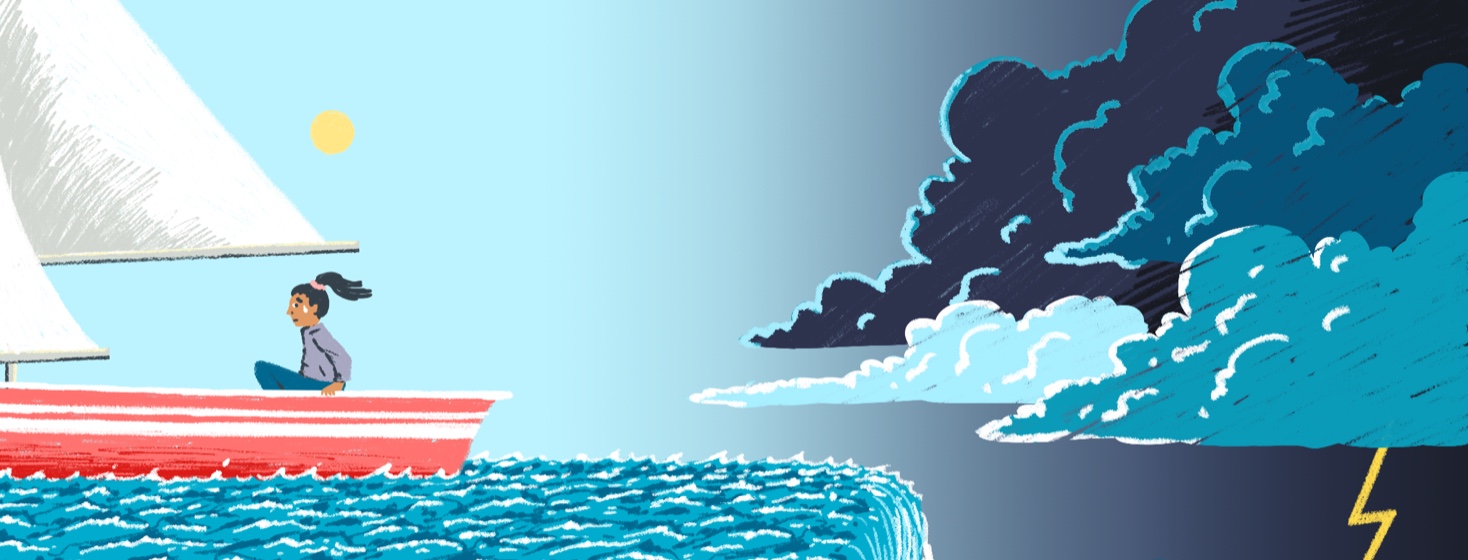Living in a Blood Cancer Bomb Cyclone
This winter, here in Massachusetts, we awaited the arrival of a huge blizzard one weekend. Weather forecasts were blaring news of worsening conditions and predicting snowfalls of more than two feet, closer to three. Winds were expected in the 60-70 mph range. The term “bomb cyclone” was bandied about on TV, online, and in written warnings.
I’ve heard bomb cyclone used so often I decided to learn more about this phenomenon. And although it may be a stretch, I see parallels between this unique sort of storm and the tumultuous "storm," we experience upon receiving a blood cancer diagnosis and then living with the disease.
Words like “devastating,” and “dramatic,” describe this weather occurrence. A bomb cyclone “intensifies very quickly, bringing intense impacts,” says a Merriam-Webster dictionary definition.vIn addition, the storm is classified by a sudden, severe drop in barometric pressure. This sharp decline is a tell-tale sign of “worsening” conditions on their way.
A leukemia diagnosis is like a bomb cyclone
Why then, seven years into a diagnosis of chronic myeloid leukemia (CML), am I likening it to the wicked weather that was headed this way? Stick with me.
Many people receiving a blood cancer diagnosis don’t see it coming. Often, they’ve gone for blood work for an upcoming surgery or just as part of a routine doctor visit.
Others, like me, sense something is wrong for a long time. In my case, I asked a different doctor for a printout of old bloodwork results. Lo and behold, there it was in black and white! It got the ball rolling.
The snowball effect
Not only did the ball get rolling, but it built up speed and careened off the side of a mountain. I was quickly referred to a hematologist, took more blood tests, told to sit in a room, and then came the news—like a punch in the nose or a whirling dervish of information.
So yeah, dramatic and devastating kind of describes it.
And once you know what is going on in your body, yes, things intensify quickly. For me, that meant:
- Getting referred to a CML specialist near where I live;
- Meeting with him for the first time;
- Hearing the cause of this leukemia (chromosomes 9 and 22 latching onto each other and forming a mutation); and
- Learning the plan of treatment (a daily oral treatment called tyrosine kinase inhibitor). I’m told I will presumably be on this TKI or another type forever.
Two days later, there was a bone marrow biopsy, the ultimate forecaster of what lurks on the horizon.
If that information doesn’t have “intense impacts,” on a patient’s emotions and body, I don’t know what will.
The not-so-calm after the storm
Then comes the journey to acceptance. I’m not positive that living with chronic leukemia or other blood cancer is something to which anyone completely adjusts without getting a bit weather-beaten and windblown in the process.
For me, as the years pass, the “worsening conditions,” after the jolting drop in health are now my reality.
Day-to-day activities are more difficult now. Mobility is a problem. Side effects from the blood cancer itself and the TKI are rampant and challenging—from bone pain and rashes to neuropathy and mind-numbing fatigue. And those are just a handful of problems this tornado of a disease brings.
Persevere through the tempest
Patients like me have no other choice but to carry on and fight our way through the battering effects and ominous clouds that follow us. Combatting cancer is truly like fighting a tempest.
The meteorologists say the bomb cyclones come and go in a day. The sun will come out and temperatures will rise in the days that follow.
Although that’s not always the case with CML (no "remission" per se, only a "response" is possible), at least we were warned about the storm. We prepared and can take measures to hunker down and ride it out as long as possible.

Join the conversation